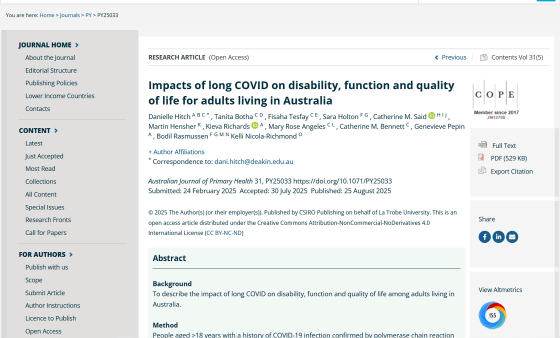The aftereffects of COVID-19, known as 'Long COVID,' significantly worsen quality of life and leave people functionally disabled for more than half of the month.

Impacts of long COVID on disability, function and quality of life for adults living in Australia | Australian Journal of Primary Health
https://www.publish.csiro.au/PY/PY25033

Long COVID is more than fatigue. Our new study suggests its impact is similar to a stroke or Parkinson’s
https://theconversation.com/long-covid-is-more-than-fatigue-our-new-study-suggests-its-impact-is-similar-to-a-stroke-or-parkinsons-263623
In Japan, in May 2023, COVID-19 was classified as a Category 5 infectious disease under the Infectious Diseases Control Act, the same as seasonal influenza, and as a result, more and more people are viewing COVID-19 as a common illness. However, some people are suffering not only from the main symptoms of COVID-19, such as fever, cough, and sore throat, which last for several days, but also from the aftereffects of long COVID.
The main symptoms of long COVID are wide-ranging, including fatigue and lethargy, muscle pain, cough, shortness of breath, chest pain, memory loss, difficulty concentrating, headache, loss of taste and smell, and muscle weakness. It is estimated that approximately 6% of people infected with the new coronavirus develop long COVID, and 3.5% of people vaccinated with the Omicron strain. Considering the number of people infected with the new coronavirus, it is likely that a considerable number of people are developing long COVID.

Previous studies have confirmed that long COVID reduces quality of life to the same extent as diseases such as
A research team led by Deakin Hitch , an associate professor at Deakin University's School of Health Sciences in Australia, conducted a survey of 121 adults across Australia suffering from long COVID. The subjects developed COVID-19 between February 2020 and June 2022 and continued to suffer from long COVID, making daily life difficult even after several months. Most of the subjects were relatively young, between 36 and 50 years old, at the time of onset of COVID-19. Their COVID-19 symptoms were not severe enough to require hospitalization, and they were treated at home.
To assess the impact of long COVID on participants, the research team asked them to complete the WHO Disability Assessment Scale (WHODAS 2.0) and the Short Form Health Survey (SF-36), both widely used to measure disability and quality of life. These surveys, unlike medical scans or blood test results, help understand the true extent to which symptoms affected participants' daily lives.

The study found that long COVID participants had more severe disabilities than 98% of the Australian population. While only 9% of the general population met the criteria for 'severe disability,' 86% of long COVID participants met the criteria. On average, participants experienced difficulty in daily activities about 27 days per month and were 'impaired' for about 18 days per month.
Long COVID had relatively little impact on activities like eating and dressing, but had a major impact on complex areas like housework and socializing. People were barely able to meet their basic needs for survival, but their ability to contribute to their homes, workplaces, and communities was limited.
Quality of life was also significantly affected by long COVID, with overall quality of life scores on average 23% lower than the general population. Energy levels and social life were particularly affected, with the fatigue and brain confusion caused by long COVID having a significant negative impact on personal activities, relationships, and community connections.

'Fatigue is more than just feeling tired. It can also mean having trouble concentrating while driving, giving up hobbies, and drifting away from important friendships,' Hitch and colleagues wrote. 'Our research shows that Long COVID disrupts patients' futures, severing connections and creating everyday challenges that ripple through their families, workplaces, and communities.'
Previous research has shown that people from disadvantaged communities are more affected by Long COVID, so ignoring the scale and severity of Long COVID risks further exacerbating existing social inequalities.
Long COVID patients need support beyond just health care to help them manage fatigue, the researchers argued, including reducing work hours, restructuring job responsibilities, and helping them rebuild social connections.
Related Posts:
in Science, Posted by log1h_ik







